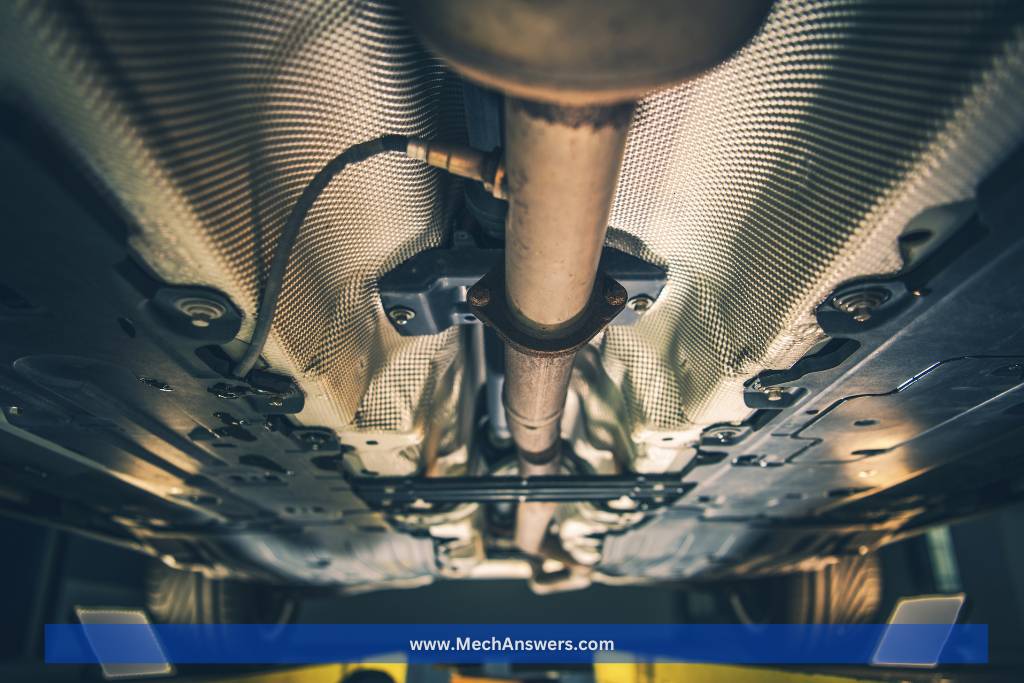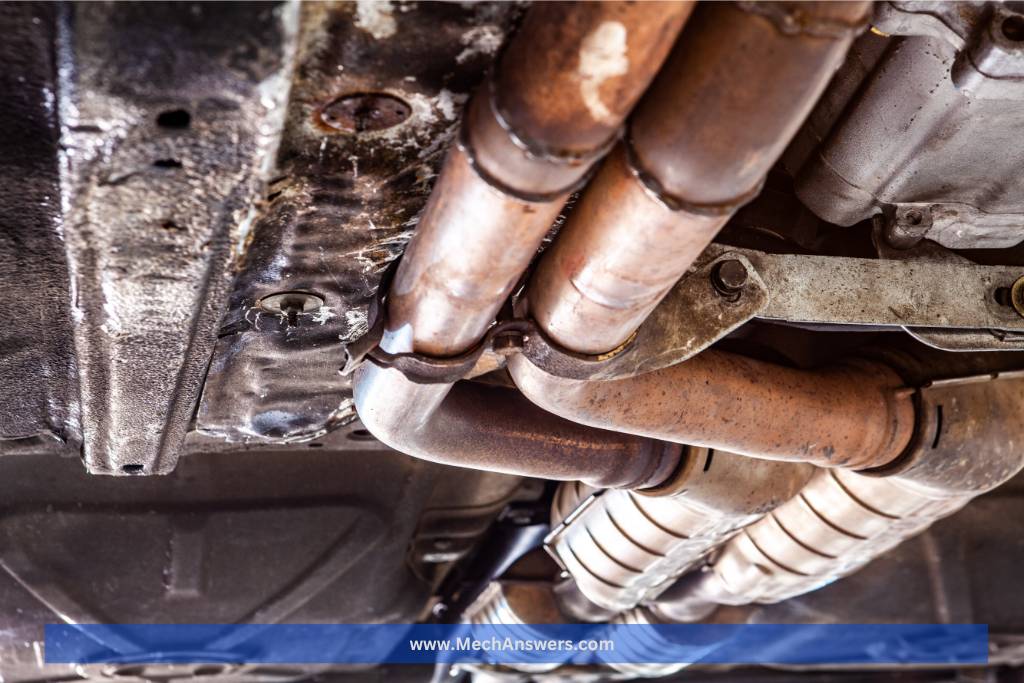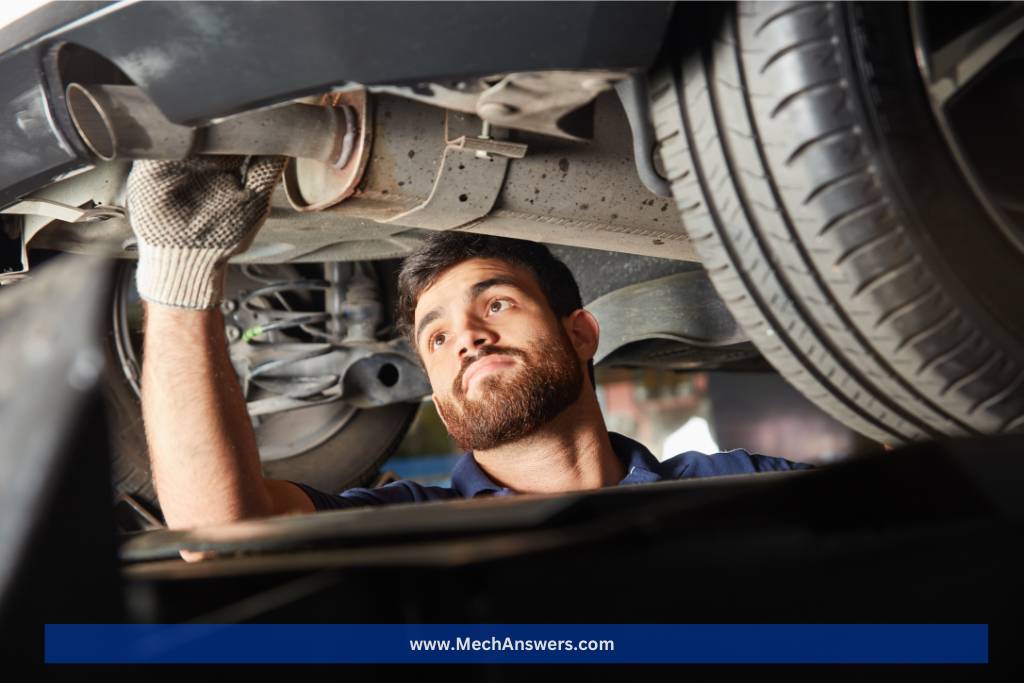You may ask yourself, perhaps even searching for “How To Fix A Loud Exhaust Noise From The Front Of The Car?”, haven’t you? Well, search no more. This comprehensive guide is specifically designed to answer that question, providing you with in-depth solutions and practical methods to silence the deafening noise from your car’s exhaust system.
So, what is the answer to “How To Fix A Loud Exhaust Noise From The Front Of The Car?” Simple: identifying the source of the noise, determining the root cause, and implementing an effective solution. This could involve adjusting the exhaust system, replacing worn-out components, or simply applying a quick fix using available resources.
Why should you read this article? Not only will you be equipped with the knowledge to tackle the noise issue yourself, potentially saving money on mechanic fees, but you will also understand your car better, making you a more informed and capable vehicle owner.

Table of Contents
Why This Is A Concerning Issue To Hear A Loud Exhaust Noise
If you hear a loud exhaust noise from the front of your car, it is a concerning issue that should not be ignored. The exhaust system is responsible for directing exhaust gases away from the engine and out of the vehicle.
When there is a problem with the exhaust system, it can lead to a host of issues that can be dangerous for both you and your car.
It can be a sign of a serious issue
Firstly, a loud exhaust noise can be a sign of a serious issue with the car’s exhaust system. The noise can be caused by a variety of factors, including a leak in the system, damaged or rusted pipes, a loose connection, or a hole in the exhaust system.
If left unchecked, these issues can lead to more severe problems, such as reduced fuel efficiency, engine damage, and potentially harmful carbon monoxide emissions.
It might affect your car’s performance
Secondly, a loud exhaust noise can also affect your car’s performance. It can reduce your car’s power, decrease acceleration, and increase the amount of time it takes to stop.
A poorly functioning exhaust system can also affect your car’s emissions, which can cause your vehicle to fail an emissions test or even result in a fine.
Difficult to hear other sounds on the road
Lastly, a loud exhaust noise can be a nuisance, both for you and other drivers on the road. It can be distracting and make it difficult to hear other sounds on the road, such as sirens or horns.
Additionally, it can be embarrassing to drive a car that makes a loud, unpleasant noise, especially if you frequently have passengers in your vehicle.
This a concerning issue that should not be ignored
A loud exhaust noise from the front of your car is a concerning issue that should not be ignored. It can lead to a range of problems that can be dangerous for you and your car, affect your car’s performance, and be a nuisance on the road.
Therefore, it is essential to address the issue promptly and have it diagnosed and repaired by a qualified mechanic.
How to Fix a Loud Exhaust Noise From The Front of The Car
Identify the Noise Source:
Start by locating the source of the noise. Turn on the engine and let it run while you carefully listen. The sound might be louder in certain areas and can help you identify its origin. Remember, safety is paramount; do not touch the exhaust system while it’s hot.
Understand the Exhaust System:
Familiarize yourself with the car’s exhaust system. It typically includes the exhaust manifold, catalytic converter, muffler, and exhaust pipes. Knowing the function of each part can help you diagnose the problem more effectively.
Check the Exhaust Manifold:
The exhaust manifold is at the front of the car. It collects the exhaust gases from the engine’s cylinders and directs them into one pipe. Look for signs of cracks, leaks, or rust, any of which can cause a loud, hissing noise.
Inspect the Catalytic Converter:
The catalytic converter, situated towards the front of the vehicle, reduces harmful emissions from the exhaust gases. Its breakdown can lead to a rattling sound. Check for damages or any signs of internal wear and tear.
Examine the Muffler and Exhaust Pipes:
Mufflers and exhaust pipes are designed to reduce and direct noise away from the vehicle. Look for holes, rust, or any other damage. An issue here could result in an increase in the exhaust sound.
Repair Minor Issues:
Minor problems like small holes or loose connections can often be fixed with an exhaust repair kit. This usually includes heat-resistant tape or paste which can seal small holes or strengthen loose connections. Always follow the instructions on the kit for the best results.
Replace Damaged Components:
More serious problems, such as a cracked exhaust manifold or a severely damaged catalytic converter, may require replacement. This is usually a more complex task and might require professional assistance, but it is often the most effective way to address loud exhaust noises.
Perform Regular Maintenance:
Regular checks and prompt repairs of minor damage are essential to prevent more serious issues in the future. Stick to a regular maintenance schedule, including inspection of the exhaust system. This can help you spot potential problems early and avoid costly repairs.
12 Causes of Loud Exhaust Noise From The Front of The Car
Exhaust leak:
A common cause of a loud exhaust noise is a leak in the exhaust system. The noise is caused by exhaust gases escaping from a damaged or rusted pipe, a loose connection, or a hole in the exhaust system. A leak can also lead to a reduction in power and fuel efficiency.
Catalytic converter failure:
A malfunctioning catalytic converter can cause a loud exhaust noise. The converter is responsible for reducing emissions, and if it fails, it can cause a blockage in the exhaust system, leading to loud noise.
Exhaust manifold cracks:
The exhaust manifold is responsible for directing exhaust gases from the engine to the exhaust system. Cracks in the manifold can cause a loud noise, as the gases escape through the crack.
Loose or broken hangers:
Hangers are used to hold the exhaust system in place. If a hanger is loose or broken, the exhaust system can hang lower than usual, causing it to make contact with other parts of the car and make a loud noise.
Exhaust pipe blockage:
A blockage in the exhaust pipe can cause a loud noise. The blockage can be caused by a buildup of debris or a foreign object lodged in the pipe.
Muffler damage:
The muffler is responsible for reducing the noise of the exhaust system. If the muffler is damaged or rusted, it can cause a loud noise.
Resonator damage:
The resonator is responsible for reducing the noise of the exhaust system. If the resonator is damaged or rusted, it can cause a loud noise.
Exhaust system rust:
Rust can weaken the exhaust system and cause holes or cracks to form, leading to loud noise.
Broken or damaged exhaust manifold gasket:
The exhaust manifold gasket is responsible for sealing the connection between the manifold and the engine. If the gasket is broken or damaged, it can cause a loud noise as exhaust gases escape.
Engine misfire:
A misfiring engine can cause a loud noise from the exhaust system. The misfire can be caused by a variety of factors, including faulty spark plugs or a clogged fuel injector.
Damaged flex pipe:
The flex pipe allows for flexibility between the engine and exhaust system. If it becomes damaged, exhaust gases can escape, leading to loud exhaust noise.
Loose exhaust system components:
Loose bolts, clamps, or brackets can cause vibrations and loud exhaust noise.

How to Diagnose a Loud Exhaust Noise From The Front of The Car
Diagnosing a loud exhaust noise from the front of a car is crucial to identifying the cause of the problem and determining the necessary repairs. Here are some steps to follow to help diagnose the issue:
Listen for the noise:
Start by identifying the exact location of the noise. Listen for the noise while the car is idling, while revving the engine, and while driving at different speeds. Pay attention to whether the noise is coming from the front or the back of the car and whether it changes with the engine’s RPM.
Visually inspect the exhaust system:
Look for any visible damage, such as cracks, holes, or rust on the exhaust system components. Check for any loose connections or broken hangers that may be causing the exhaust system to hang lower than usual.
Perform a pressure test:
A pressure test can help identify any leaks in the exhaust system. A mechanic will block off the tailpipe and then pump air into the system to check for leaks. The test can help identify leaks in the muffler, pipes, and other components of the exhaust system.
Use a stethoscope:
A stethoscope can help pinpoint the source of the noise. Place the stethoscope on different parts of the exhaust system while the engine is running to identify where the noise is coming from.
Check engine codes:
A loud exhaust noise can sometimes be caused by a problem with the engine. Check the car’s onboard computer for any codes that may indicate an issue with the engine, such as a misfire or a malfunctioning sensor.
Diagnosing a loud exhaust noise from the front of a car requires a systematic approach. By listening for the noise, visually inspecting the exhaust system, performing a pressure test, using a stethoscope, and checking engine codes, you can identify the source of the noise and determine the necessary repairs.
It is important to address the issue promptly to avoid further damage to your car’s exhaust system and ensure your safety on the road.
DIY Repairs
DIY repairs can be done by car owners with some experience and the right tools. However, if the repair is complex, it is recommended to have it done by a professional mechanic to ensure the job is done correctly and safely.
Additionally, some repairs may require special equipment or specialized knowledge, making it difficult for the average car owner to complete the job themselves.
Fixing a loud exhaust noise from the front of a car requires identifying the cause of the problem and selecting the appropriate repair option.
Whether it is replacing damaged parts, sealing leaks, replacing a catalytic converter, adjusting or replacing hangers, cleaning out blockages, or replacing damaged gaskets, the repairs can be done by a professional mechanic or a DIYer with some experience and the right tools.
It is important to address the issue promptly to avoid further damage to your car’s exhaust system and ensure your safety on the road.

Related Articles
Read more >> 10 Expert Tips on How to Get Water Out of Your Exhaust!
Read more >> 10 Cheapest Ways to Fix A Catalytic Converter On A Budget!
Read more >> 12 Hacks How To Fix Catalytic Converter Without Replacing!
Read more >> Can A Catalytic Converter Go Bad From Sitting? (Read This!)
Read more >> Is It Worth Replacing Or Fixing The Catalytic Converter?
Read more >> What Is The Easiest Way To Clean A Catalytic Converter?
Conclusion
A loud exhaust noise from the front of a car can be a concerning issue, as it can affect the performance of the vehicle and compromise the safety of the driver and passengers. The causes of the issue can range from damaged or rusted parts to leaks, blockages, and malfunctioning catalytic converters. Identifying the cause of the problem is the first step in finding the appropriate solution, which can range from DIY repairs to professional mechanic services.

